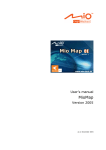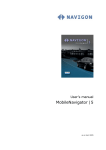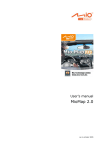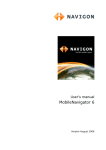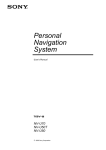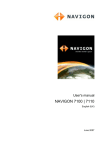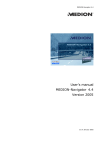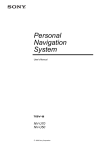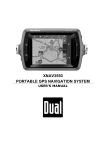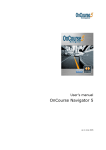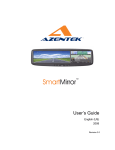Download Navigon MN4 User's Manual
Transcript
User's manual MobileNavigator User's manual MobileNavigator BLUE Edition as on October 2004 Impressum NAVIGON GmbH Berliner Platz 11 D-97080 Würzburg Hotline (dtms-Service, 0,12 €/min): +49 180-5-NAVIGON (+49 180-5-6284466) The information contained herein may be changed at any time without prior notification. This manual nor any parts thereof may not be reproduced for any purpose whatsoever without the express written consent of NAVIGON GmbH, nor transmitted in any form either electronically or mechanically, including photocopying and recording. Copyright 2004, NAVIGON GmbH All rights reserved. User's manual BLUE Edition Table of contents 1 2 3 4 User's manual Introduction................................................................ 3 1.1 Important safety information ............................................. 4 1.1.1 Safety information on navigation ............................. 4 1.1.2 Safety information on the GPS receiver .................... 5 1.1.3 Safety information on the installation in the vehicle................................................................. 5 1.2 Search facilities and conventions........................................ 6 1.3 Liability .......................................................................... 6 1.3.1 Support ............................................................... 7 1.4 Trademarks .................................................................... 7 Installation and quick-start guide ............................... 9 2.1 Operating mode of your navigation system ........................ 10 2.2 Installation of the navigation system ................................ 11 2.2.1 Inserting the memory card into the device .............. 11 2.2.2 Installing the navigation software .......................... 11 2.2.3 Software registration and activation ....................... 12 2.2.4 Installation in the vehicle...................................... 14 2.2.5 Fitting MobileNavigator on your bike ...................... 15 2.2.6 Starting navigation .............................................. 16 Operating the navigation software............................ 19 3.1 Starting MobileNavigator................................................. 20 3.1.1 Basic settings ..................................................... 21 3.2 User interface and basic functionality................................ 25 3.2.1 Icons ................................................................. 25 3.2.2 Hardware keys .................................................... 27 3.3 Indicating destinations.................................................... 29 3.3.1 Entering a destination manually............................. 30 3.3.2 Selecting a special destination............................... 32 3.3.3 Indicating destinations on the map ........................ 36 3.3.4 Saved destinations .............................................. 38 3.3.5 Recent destinations ............................................. 39 3.3.6 Save and use your home address .......................... 42 3.4 Working with the map .................................................... 44 3.4.1 Operating the map .............................................. 45 3.4.2 Representation of the map in navigation mode ........ 49 3.4.3 Displaying additional information on the map .......... 51 Navigation and Itinerary planning ............................ 53 4.1 General notes on navigation ............................................ 54 4.2 Navigating to a destination.............................................. 55 4.3 Navigating to several destinations (Itinerary planning) ........ 57 4.3.1 Working on itineraries, storage and management..... 59 4.3.2 Simulating the route ............................................ 60 4.4 Functions which are useful for navigation .......................... 61 4.4.1 Displaying the route list........................................ 61 4.4.2 Adding a stage point during navigation ................... 62 4.4.3 Blocking a route section ....................................... 63 Table of contents i User's manual BLUE Edition 5 Appendix................................................................... 65 5.1 Configuration of MobileNavigator...................................... 66 5.1.1 Map information .................................................. 66 5.1.2 Route information................................................ 67 5.1.3 Volume .............................................................. 67 5.1.4 Representation.................................................... 68 5.1.5 Touch screen calibration ....................................... 68 5.1.6 Auto mode ......................................................... 68 5.1.7 Speed profile ...................................................... 69 5.1.8 Itinerary ............................................................ 69 5.1.9 Time zone .......................................................... 69 5.1.10 Format............................................................... 69 5.1.11 Home address..................................................... 70 5.1.12 Radio-Mute......................................................... 70 6 Glossary .................................................................... 71 7 Index ........................................................................ 73 User's manual BLUE Edition 1 Introduction Topics covered in this chapter: 1.1 Important safety information page 4 Safety information on navigation Safety information on the GPS receiver Safety information on the installation in the vehicle 1.2 Search facilities and conventions page 6 1.3 Liability page 6 Support 1.4 Trademarks Introduction page 7 -3- User's manual BLUE Edition 1.1 Important safety information Note 1.1.1 In your own interest, read the following notices and safety information carefully before starting up your navigation system. Safety information on navigation The use of MobileNavigator may only be effected at your own risk. Attention: To protect yourself and others from accidents please do not operate the navigation system while driving! Attention: You must not look at the display except when it is absolutely safe to do so! Attention: The road layout and the traffic signs are absolutely prior to the instructions of the navigation system. Attention: You must not follow the instructions of MobileNavigator except when the circumstances and the road traffic regulations allow doing so. MobileNavigator will guide you to your destination even when you have left your planned itinerary. Notice: We recommend to effect route planning before beginning the journey. If you are on the road and you want to establish a new itinerary, please drive to the next parking site! Notice: If you have not understood the instructions or if you are not sure about what to do next you may quickly refer to the map or arrow view of your navigation system. Introduction -4- User's manual BLUE Edition 1.1.2 Safety information on the GPS receiver Attention: As it is not waterproof, don’t expose your GPS receiver to water! Attention: Do not install the cable next to security relevant equipment and supply lines. Attention: Please check the security relevant equipment when you have installed the navigation system. Attention: The GPS receiver should be disconnected from the power supply while your car is parking. As it spends energy permanently you might risk discharging the car battery. Attention: The installation of the GPS receiver must not interfere with the sure operation of your car. Notice: Do not varnish the GPS receiver. Doing so might impede the reception of GPS signals. Notice: Do not use any harsh solvents for cleaning the GPS receiver. A damp cloth is sufficient! You might damage the case of the GPS receiver. Notice: Do not unplug by pulling the cable. This might damage the cable! Notice: Do not fold the cable. Check that the cable may not be damaged by any sharp object. 1.1.3 Safety information on the installation in the vehicle Attention: Do not fix the holder within the deployment zone of airbags. Attention: When you install the holder, please check that it may not constitute any safety risk, even in case of an accident. Introduction -5- User's manual BLUE Edition 1.2 Search facilities and conventions Find information quickly This manual offers the following search facilities: In the footnote at the bottom of the page, you may check which chapter and which section you are actually reading. A glossary at the end of the manual contains explanations on the technical terms used in this manual. An index at the end of the manual allows precise search for the information contained in this manual. Conventions The conventions on the fonts and symbols used in this manual are explained in the two following tables: Font Use bold Buttons, icons, names of entry fields, and elements of the software’s user interface. Also used for highlighting warnings and notices. bold italic Registered names and trademarks. SMALL CAPITALS Window and dialogue box titles. Symbol Use Indicates hints and notices that may ease the use of MobileNavigator. Indicates additional information. Warns against dangers that might cause damage to objects and persons. 1.3 Liability Limitation of liability The software and the manual are subject to change without notice. NAVIGON GmbH may not be liable for the correctness of the information contained in this manual nor for damages resulting from the use of this manual. To improve the quality of our products and our services, we appreciate all suggestions for improvement and all error notices. Introduction -6- User's manual BLUE Edition 1.3.1 Support You need help? Call our support staff for Telephone support: Mondays to Fridays 9am to 6pm +49 180-5-NAVIGON (0180-5-6284466) (dtms-Service, 0,12 €/min) Or call our Fax support: +49 180-5-6284444 (dtms-Service, 0,12 €/min) Further information may also be found on the web site of NAVIGON GmbH (www.navigon.com) in the Support section. 1.4 Trademarks Registered trademarks All brands and trademarks mentioned in this document are possibly registered by third party and subject to the current legislation and to the rights of their respective owners without reservation. All mentioned names of products, societies, or brands may be registered trademarks of their respective owners. Every right that is not explicitly accorded is reserved. The absence of an explicit labelling of registered trademarks does not allow the conclusion that this brand was not subject to the rights of third party. Windows and ActiveSync are registered trademarks of the Microsoft Corporation. Introduction -7- User's manual BLUE Edition 2 Installation and quick-start guide Topics covered in this chapter: 2.1 Operating mode of your navigation system page 10 2.2 Installation of the navigation system page 11 Inserting the memory card into the device Installing the navigation software Software registration and activation Installation in the vehicle Fitting MobileNavigator on your bike Starting navigation Installation and quick-start guide -9- User's manual BLUE Edition 2.1 Operating mode of your navigation system MobileNavigator The time of complicated and frustrating inquiries on the right way in folded maps is over. From now on MobileNavigator, your navigation system, will guide you, based on satellite information, quickly and safely to your destination. GPS-based navigation Based on satellites the Global Positioning System (GPS) determines your current geographical position. The GPS has originally been developed as a weapon guidance system for the American forces. Operating mode of the GPS The GPS is based on 24 satellites, which are in orbit round the earth. They are permanently emitting the time and their current position. The GPS receiver receives this information and calculates the longitude and the latitude of its own actual position. The signals of at least three satellites are needed to determine the longitude and the latitude. With the signals of at least four satellites the elevation may be calculated, too. The determination has an accuracy of about 3 yards. Installation and quick-start guide - 10 - User's manual BLUE Edition 2.2 2.2.1 Installation of the navigation system Inserting the memory card into the device Insert the memory card into the device… Before using MobileNavigator you must insert the memory card containing the cartographic data into the device. 1. Unpack the memory card carefully. Pay attention not to touch contacts and not to make them dirty. as shown below (label up, cut 2. Hold the memory card corner bottom right). Insert the memory card into the at the left of the device. It should snap in. respective slot Notice: The memory card must stay inserted in the device while you are using the navigation system. If you remove the card while using the system, it executes a soft reset and prompts you to insert the memory card. 2.2.2 Installing the navigation software Install the navigation software... 1. Take the stylus and push the main switch on the pack of the device to the ON position. The brand logo is being displayed for a short time. The installation procedure starts automatically. After a few seconds, the system prompts you to enter the activation Installation and quick-start guide - 11 - User's manual BLUE Edition code. Notice: Depending on the battery charging state, it may happen that you have to charge the device for a while before the installation may be executed. 2.2.3 Software registration and activation Activation code At the first start of MobileNavigator you will be prompted to enter an activation code. You cannot start the software without entering this code. To obtain the activation code, you will need the serial number, which is printed on the back of the MobileNavigator booklet and the Hardware-ID, which is indicated at the first start of the software. With these two numbers you may obtain the activation code: in the web on www.navigon.com by SMS: simply send the serial number, device ID, your first name surname and email address (separated by commas) to: +49 (0) 176 – 888 333 88 or by phone from our support staff: +49 180-5-6284466 (dtms-Service, 0,12 €/min). Installation and quick-start guide - 12 - User's manual BLUE Edition 1. Tap the <please select> button. The ACTIVATION CODE screen opens: 2. Enter the activation code into the respective entry field. 3. Tap the OK button. Notice: Keep the activation code at a safe place. You might need it later, e.g. when you reinstall the software on your Pocket PC. Installation and quick-start guide - 13 - User's manual BLUE Edition 2.2.4 Installation in the vehicle Attention: The mounted holder must not impede the driver’s attention on the traffic. If this is not possible, mount the holder somewhere else so that safe driving is granted. Mounting the holder... 1. Attach the cradle of the device to the swan-neck mount. Notice: Take notice of the inscription on the swan-neck mount. The arrow with the inscription close must show in snap-on direction. The connection must snap on audibly. 2. Place the suction cup on the windscreen. Press the lever firmly to the windscreen before switching it. 3. Insert the device into its holder. First place the bottom of the device correctly, then push it backwards until it snaps into the clip. of the power supply cable into the 4. Insert the chinch jack respective socket at the bottom of the device. 5. Insert the power jack Installation and quick-start guide into the cigarette lighter. - 14 - User's manual BLUE Edition 2.2.5 Fitting MobileNavigator on your bike Mount the fitting... 1. Connect the clamp and the mounting plate . Pull the clamp round the handle bar as represented above (opening up, plate towards the driver). Do not forget to put the rubber which is included in the delivery between the handle band bar and the clamp. The clamp is flexible, so you can open it carefully, place it round the handle bar and close it. onto the mounting plate . 2. Put the cradle of the device Push the holder downwards until it snaps in noticeably. Please note that there is only one correct position for the holder to be fitted. 3. Fix the complete holder kit with the included screw the screw only slightly for the moment. . Fasten 4. Insert the device into its cradle. Verify that the clip snaps noticeably! 5. Turn the holder until you may read the screen well while sitting on the bike. 6. Fasten the screw. Installation and quick-start guide - 15 - User's manual BLUE Edition 2.2.6 Starting navigation Use your navigation system… 1. Turn on your MobileNavigator. At the first start of MobileNavigator, the following message appears: 2. Tap the I accept button. If you do not accept and if you tap the I refuse button, the device turns off. 3. The MAIN SCREEN appears. 4. Tap the One destination button to enter your destination. The DESTINATION screen opens: Installation and quick-start guide - 16 - User's manual BLUE Edition 5. Tap the Address button. The ADDRESS screen opens: 6. Enter the name of the destination town into the Town field. 7. Enter the name of the destination street into the Street field. Enter the house number if possible. 8. Tap the Start navigation button. For details on the functions of your navigation system, please refer to “Operating the navigation software”, page 19, and to “Navigation and Itinerary planning”, page 53. Installation and quick-start guide - 17 - User's manual BLUE Edition 3 Operating the navigation software Topics covered in this chapter: 3.1 Starting MobileNavigator page 20 Basic settings 3.2 User interface and basic functionality page 25 Icons 3.3 Indicating destinations page 29 Entering a destination manually Selecting a special destination Indicating destinations on the map Saved destinations Recent destinations Save and use your home address 3.4 Working with the map page 44 Operating the map Representation of the map Displaying additional information on the map Operating the navigation software - 19 - User's manual BLUE Edition 3.1 Starting MobileNavigator Precondition You have carried out installation and activation of MobileNavigator as described in “Installation of the navigation system”, page 11. Starting the navigation software… 1. Turn MobileNavigator on. The MAIN SCREEN opens: Main screen All functions of the program are accessible via the MAIN SCREEN. Notice: When you turn MobileNavigator on, it shows the screen, which was displayed when MobileNavigator was turned off. Nevertheless, you may access the Main screen from all other screens by tapping . Indicate a destination Tap this button to indicate a destination for navigation (one stage). For details, please refer to “Indicating destinations”, page 29. Navigating home Tap this button to navigate to your home address. For details, please refer to “Save and use your home address”, page 42. Several destinations Tap this button for itinerary planning purposes. Operating the navigation software - 20 - User's manual BLUE Edition For details, please refer to “Navigating to several destinations (Itinerary planning)”, page 57. Show map Tap this button to display the map currently in use. Select map Tap this button to select another map, which is stored on your device. For details, please refer to “Working with the map”, page 44. Settings Tap this button to modify the settings of MobileNavigator. For details, please refer to “Configuration of MobileNavigator”, page 66. Quit 3.1.1 Tap this button to quit MobileNavigator. Basic settings Basic settings Before working with MobileNavigator, we recommend indicating the time zone of the region you are staying in currently so that the system can indicate correct times of arrival in navigation mode, entering the home address. You may then navigate home from anywhere. Indicate the time zone 1. On the MAIN SCREEN, tap Configuration. The CONFIGURATION screen opens. 2. Via the arrow buttons, select the TIME ZONE screen. Operating the navigation software - 21 - User's manual BLUE Edition 3. Tap into the Time zone entry filed. The SELECT THE TIME ZONE screen opens. 4. Select the time zone of the region you are currently staying in.(GMT without daylight saving time). The indication of capitals lying in the respective time zones makes the selection easier. 5. Tap Ok. 6. If there is currently daylight saving time, tap the Daylight saving time entry field. The entry switches to Yes. Saving your home address In MobileNavigator, you may save your home address to quickly start navigation homewards from anywhere. 1. On the MAIN SCREEN, tap Settings. The SETTINGS screen opens. Operating the navigation software - 22 - User's manual BLUE Edition 2. Via the arrow buttons, select the HOME ADDRESS screen. 3. Tap Enter your home address. The DESTINATION screen opens. 4. Tap the Address button and enter your home address as described in “Entering a destination manually”, page 30. 5. Tap the Set as home address button. The address is indicated on the HOME ADDRESS screen. Operating the navigation software - 23 - User's manual BLUE Edition 6. Tap Save. Operating the navigation software - 24 - User's manual BLUE Edition 3.2 User interface and basic functionality Operation In order to offer a maximum of flexibility and convenience for the operation of MobileNavigator there is three ways to make entries: tapping with the stylus, tapping with your finger, or via the hardware keys of your Pocket PC. 3.2.1 Icons Icons The following buttons appear at the right of every MobileNavigator screen: Return Tap this icon to return to the previous screen. This icon is not available on the MAIN SCREEN. Main screen Tap this icon to open the main screen. This icon is not available on the MAIN SCREEN. Operating the navigation software - 25 - User's manual BLUE Edition GPS The colour of this icon and the number displayed on it have the following significance: Colour/Number Significance red A GPS receiver is not connected or the power supply is interrupted. orange + number of received satellites A GPS receiver is connected, but the received signals are not convenient for navigation purposes (e.g. because you are in a closed building). green + number of received satellites The signals are convenient. Navigation may begin. Tap the GPS icon to display the current GPS status: Entry Significance GMT Greenwich Mean Time Time of London ignoring daylight saving time. Longitude / Latitude Current position: Indication of east longitude and north latitude. Satellites Number of received satellites. At least three satellites must be received for navigation purposes. HDOP Horizontal Dilution of Precision: Indicates the quality of position determination. Theoretically any value from 0 to 50 may occur. The smaller the value, the more accurate is the position determination (value 0 = no deviation from the real position). Values up to 8 are convenient for navigation purposes. Speed Indicates your current speed. Operating the navigation software - 26 - User's manual BLUE Edition Entry Significance Position Indicates the address of your current position. Save Tap this button to add the current address to the saved destinations list. Quit Tap this button to quit the GPS screen. Switching the GPS-receiver on / off The GPS-receiver consumes energy. This is of significance when the system is operated in battery mode, e.g. when you are on your way on foot or by bike. Switch therefore the GPS-receiver off when you don’t need it for a certain time. 1. Tap the Energy icon screen. on the lower right corner of any The ENERGY screen opens: 2. Tap the Off button to switch the GPS receiver off. 3. When the GPS-symbol in the upper right corner becomes red, tap the Cancel button. Notice: Switching the GPS-receiver on works the same way. 3.2.2 Hardware keys Hardware keys On the upper right corner of your device, there are the following hardware keys which allow to accede quickly the most important functions: On / Off Turns the device on / off. Configuration Opens the CONFIGURATION screen. Back Opens the precedent screen. Destination Opens the DESTINATION screen. Operating the navigation software - 27 - User's manual BLUE Edition Zoom out Works only in map view mode. Zoom in Works only in map view mode. Operating the navigation software - 28 - User's manual BLUE Edition 3.3 Indicating destinations Basic principle of navigation The indication of destinations is the basis of navigation respectively of itinerary planning. In this chapter, you will learn about the possibilities to indicate and manage destinations in MobileNavigator. For details on destination management, please refer to “Navigation and Itinerary planning”, page 53. Indicating a destination In MobileNavigator there are several possibilities to enter or to select destinations: Via a manual address entry, see page 30. Via the Special destinations function, see page 32. By indication on the map, see page 36. By selection from the Saved destinations list, see page 38. By selection from the Recent destinations list, see page 39. Via the Home icon, see page 42. Destination screen If you want to plan an itinerary or to navigate to a certain destination, you have to indicate destinations. The DESTINATION screen is the starting point for the indication or selection of a destination: Operating the navigation software - 29 - User's manual BLUE Edition 3.3.1 Entering a destination manually Database of places The data of all places covered by the currently loaded map is stored in the database of places. You need not enter the complete names of towns and streets as MobileNavigator lists automatically all names that match with your entry. If you enter for example "bab" into the Town entry field you will obtain a list of all towns beginning or having into their names "bab" or "bab". You may then select the correct entry or enter more letters to shorten the results list. Entries All entries may be done with the finger on the software keyboard. You need not enter special characters when entering a destination's city or street name. MobileNavigator replaces these characters automatically. When you are looking for, e.g., a town called "Würzburg", simply type "wurzburg". Switching between character and number entry Tap the icon to enter numbers, e.g. for a postcode. Tap the icon to return to the character entry mode. Enter a space character, delete a single character Tap the key to insert a space character. Tap the key to delete the character to the left of the insertion mark. Operating the navigation software - 30 - User's manual BLUE Edition Special characters When you tap a key, a line above the software keyboard appears which lists all characters that may be entered by this key. The active character is highlighted. If you want to type "ö", tap the "mno" key repeatedly until "ö" is highlighted in the line above the software keyboard. Indicating a destination… 1. On the main screen tap One destination. The DESTINATION screen opens. 2. Tap the Country entry field and select the destination country. 3. Tap the Address entry field. The ADDRESS screen opens: 4. Enter the destination town into the Town entry field. Enter either its name or its postcode. 5. Enter the destination street into the Street entry field. Enter a house number into the field at the right hand side if possible. Notice: If the house numbers of the respective street are stored in the database of places, you may tap the field besides the Street field. If no house numbers are stored, the respective field is deactivated. The software navigates to the respective street. 6. Enter the name of a crossroad into the Intersection entry field if you want to define an intersection as destination point (e.g. because the house number is not available). 7. Tap the Save button if you want to navigate more often to the entered destination. You may then quickly select it from the Saved destinations list. Operating the navigation software - 31 - User's manual BLUE Edition 3.3.2 Selecting a special destination Special destinations Special destinations, also known as POIs (Points of Interest), are stored in the database of places and may be displayed on the map. Ports, airports, restaurants, hotels, petrol stations, public buildings, and others belong to the special destinations. Indicate a special destination by selecting one on the map, see “Indicating destinations on the map”, page 36, nearby, of supraregional interest, or in another town. Selecting a special destination... 1. On the DESTINATION screen, tap the Special destination button. The SPECIAL DESTINATIONS screen opens: Operating the navigation software - 32 - User's manual BLUE Edition Special destinations nearby Notice: You may only display special destinations nearby when the GPS receiver is turned on and when the GPS signal strength is sufficient. Selecting a special destination nearby... 2. On the SPECIAL DESTINATIONS screen, tap the Nearby button. The SPECIAL DESTINATIONS NEARBY screen opens: 3. Enter the radius around your current position within which you want to search for special destinations into the Radius entry field. 4. Select the main category of special destinations to search for from the left one of the two Category list fields, e.g. “Garages”. Only special destinations situated within the indicated radius will be displayed. 5. Select the sub-category of special destinations to search for into the right one of the two Category list fields, e.g. “BMW”, “Ford”, “Volkswagen”. Notice: If you leave the Sub-category field empty, all special destinations matching with the selected main category will be listed in the Special destination list field. 6. Select the correct destination from the Special destination list field. All special destinations matching your entries are listed, including their linear distance from your current position: Operating the navigation software - 33 - User's manual BLUE Edition 7. Tap the Save button if you want to navigate more often to the entered destination. You may then quickly select it from the Saved destinations list. Special destinations of superregional significance Selecting a special destination of superregional significance... 2. On the SPECIAL DESTINATIONS screen, tap the Of superregional significance button. The SPECIAL DESTINATIONS OF SUPERREGIONAL SIGNIFICANCE screen opens: 3. Select the main category of special destinations to search for from the Category list field, e.g. “Airports”. 4. Select the correct destination from the Special destination list field. 5. Tap the Save button if you want to navigate more often to the entered destination. You may then quickly select it from the Saved destinations list. Operating the navigation software - 34 - User's manual BLUE Edition Special destination in another town Selecting a special destination in another town... 2. On the SPECIAL DESTINATIONS screen, tap the In another town button. The SPECIAL DESTINATIONS IN ANOTHER TOWN screen opens: 3. Enter the name of the town in which you want to search for special destinations into the Town field. 4. Select the main category of special destinations to search for from the left one of the two Category list fields, e.g. “Nightlife”. Only special destinations matching your Town and Category entries are listed. 5. Select the sub-category of special destinations to search for into the right one of the two Category list fields, e.g. “Bar”, “Cinema”, … 6. Select the correct destination from the Special destination list field. Notice: If you leave the Sub-category field empty, all special destinations matching with the selected main category will be listed in the Special destination list field. If you leave both the Category and the Sub-category fields empty, all special destinations situated in the selected town will be listed in the Special destination list field. 7. Tap the Save button if you want to navigate more often to the entered destination. You may then quickly select it from the Saved destinations list. Operating the navigation software - 35 - User's manual BLUE Edition 3.3.3 Indicating destinations on the map You may indicate a destination directly on the map. In addition to towns and streets, you may also select special destinations quickly.. Indicating a destination on the map... 1. On the main screen tap One destination. The DESTINATION screen opens. 2. Tap the Indicate on map button. The MAP screen opens: 3. Tap on the place you want to determine as destination and hold. A circle of orange points appears round the selected place: Operating the navigation software - 36 - User's manual BLUE Edition Database information on the respective place will be loaded and displayed: 4. Tap the Task field. The TASK screen opens where you may indicate how to proceed: 5. Select Start navigation from the list to navigate to the respective place. Tap the Save button if you want to navigate more often to the entered destination. You may then quickly select it from the Saved destinations list. The TASK screen closes and the task is indicated on a new screen. 6. Tap the Execute button. Operating the navigation software - 37 - User's manual BLUE Edition 3.3.4 Saved destinations Saved destinations All destinations you have saved by tapping the Save button are listed on the SAVED DESTINATIONS screen. . On this screen you may: select destinations for navigation purposes, rename destinations, and delete destinations from the list. 1. On the DESTINATION screen tap Saved destinations. The SAVED DESTINATIONS screen opens. Take over 2. Tap the entry of the respective destination. Notice: The list may be scrolled via the “up” and “down” icons. You may as well enter the first letter of the respective destination. The list will then automatically scroll to the first destination matching your entry. 3. Tap OK. The destination will be taken over. The address is entered into the respective fields. Operating the navigation software - 38 - User's manual BLUE Edition Renaming a destination 1. Tap the Saved destinations button. 2. Tap the entry of the destination to be renamed. 3. Tap the Rename icon. The SAVE AS… dialog box opens. 4. Enter the new name. 5. Tap OK. The destination is now renamed. Deleting a destination 1. Tap the Saved destinations button. 2. Tap the entry of the destination to be deleted. 3. Tap the Delete icon. The destination is now deleted. 3.3.5 Recent destinations Recent destinations All destinations you have navigated to recently are listed on the RECENT DESTINATIONS screen. On this screen you may: select destinations for navigation purposes, Add destinations to the SAVED DESTINATIONS list, and delete destinations from the list. Operating the navigation software - 39 - User's manual BLUE Edition Taking over 1. On the DESTINATION screen tap the Recent destinations button. The RECENT DESTINATIONS screen opens. 2. Tap the entry of the desired destination. Notice: The list may be scrolled via the “up” and “down” icons. You may as well enter the first letter of the town of the desired destination. The list will then automatically scroll to the first destination matching your entry. 3. Tap OK. The destination will be taken over. The address is entered into the respective fields. Operating the navigation software - 40 - User's manual BLUE Edition Renaming a destination 1. Tap the Recent destinations button. 2. Tap the entry of the destination you want to save. 3. Tap the Save icon. The NAME OF THE DESTINATION dialog box opens. 4. Enter a name for the destination. 5. Tap OK. The destination is now saved and will appear on the SAVED DESTINATIONS list. Deleting a destination 1. Tap the Recent destinations button. 2. Tap the entry of the destination to be deleted. 3. Tap the Delete icon. The destination is now deleted. Operating the navigation software - 41 - User's manual BLUE Edition 3.3.6 Save and use your home address Survey You may store your home address in MobileNavigator in order to quickly start navigation home at any place. Saving your home address… 1. On the Main screen, tap the Settings button The SETTINGS screen opens. 2. Via the "Left" and "Right" icons, select Home address. 3. Tap the Enter your home address button. The DESTINATION screen opens. Operating the navigation software - 42 - User's manual BLUE Edition 4. Tap the Address button and enter your address as described in “Entering a destination manually”, page 30. 5. Tap the Set as home address button. The address is taken over to the HOME ADDRESS screen. 6. Tap the Save button. Using your home address for navigation... 1. On the main screen, tap . The route is now being calculated and navigation starts. The route options you have chosen for the last navigation are applied. Operating the navigation software - 43 - User's manual BLUE Edition 3.4 Working with the map Survey There are various pieces of information available on the MAP screen. Learn in this chapter about the possibilities for working with the map, which depend on whether you are in navigation mode, or not. Displaying the map On the main screen, tap the Show map button to open the MAP screen. Using the delivered maps There are two CDs (CD-ROM2 und CD-ROM3) with additional maps included in the delivery. If you wish to use one of those maps on your navigation system, transfer the desired map from the respective CD to a memory card using a memory reader. Proceed then as described in "Selecting a map" (see below). Selecting a map To load another map which is available on the currently inserted memory card, proceed as follows: Notice: If the desired map is on another memory card, remove the card, which is currently inserted. MobileNavigator turns off. Insert the card with the desired map. MobileNavigator turns on again. Even if there is only one single map on the memory card, you have to select it manually as described below. 1. On the main screen, tap the Choose map button. The Available maps screen opens: 2. Tap the entry of the map you want to work with. 3. Tap OK. The selected map is now loaded. The main screen opens. Operating the navigation software - 44 - User's manual BLUE Edition 3.4.1 Operating the map Displaying the map You may display the map while planning an itinerary, in order to show destinations on the map, or in order to select destinations on the map. You may display the map via the Show map button on the main screen or via the Show on map and Select on map buttons which are available when you indicate a destination. On the DESTINATION screen you may tap the SELECT ON MAP button to display the map. The map is being displayed automatically when you are navigating. Tapping the map The icons appear when you tap the map. If you tap a place on the map and hold information on this place will be displayed and you may, e.g., take over the data for navigation purposes. For details, please refer to “Indicating destinations on the map”, page 36. Operating the navigation software - 45 - User's manual BLUE Edition Icons The following icons are displayed on the map: Zoom / Scroll Tap the Zoom/Scroll icon ( or ) to switch between Zoom and Scroll mode. Zoom In Zoom mode (the icon appears white) you may scale the map up or down. Zoom in by drawing a rectangle on the map, beginning with the upper left corner. Zoom out by beginning with the lower right corner. Scrolling In Scroll mode (the icon appears red) you may scroll the map. Tap on the screen and drag to the desired direction. Itinerary planning This icon is active when a calculated itinerary is loaded. Tap the Itinerary icon to display the whole itinerary. Tapping this icon again will display the precedent representation of the map. North orientation Tap the Orientation icon to north orientate the map. (the icon appears red). Tapping this icon again will orientate the map in driving direction (the icon appears white). Centre (GPS reception necessary) Tap the Centre icon to centre your current position on the map. 3D view (GPS reception necessary) Tap the 3D icon to display the map in 3D mode (bee flight view). The icon becomes the 2D icon. Tap the 2D icon to return to the 2D mode (standard). The icon becomes the 3D icon. Zoom in Tap Zoom in to scale the map down. Zoom bar Zoom bar Drag the control to the left or to the right in order to modify the scale of the map. Zoom out Tap Zoom out to scale the map up. Operating the navigation software - 46 - User's manual BLUE Edition Auto mode (GPS reception necessary) Tap the Auto icon to display the standard representation of the map after you have modified the view. The settings of 3D view, north orientation and autozoom mode will be applied. Your current position will be centred. The icons will not be displayed. For details please refer to "Auto mode", page 68. Additional functions Tap the Additional functions icon to display the ADDITIONAL screen. The availability of some functions depends on whether you are being in navigation mode or not. FUNCTIONS The ADDITIONAL FUNCTIONS screen opens: Tap the Day icon to adapt the brightness of the screen to daylight conditions. Tap the Night icon to adapt the brightness of the screen to night conditions. Tap these icons to start / stop guidance by speech. Show route list This feature is only available in navigation mode or when a calculated itinerary is loaded. Tap Show route list to display a list of all important waypoints of the route. For details, please refer to “Displaying the route list”, page 61. Operating the navigation software - 47 - User's manual BLUE Edition Change preferences Tap Change preferences to display the SETTINGS screen. For details, please refer to “Configuration of MobileNavigator”, page 66. Quit navigation This function is only available in navigation mode. Tap Quit navigation to exit navigation mode. Block, Unblock, New block These functions are only available in navigation mode. For details, please refer to “Blocking a route section”, page 63. Set interim destination This function is only available in navigation mode. Tap Set interim destination to add a new route point to your itinerary. The route will be recalculated and the newly added route point will be the first destination to navigate to. Navigation to the other route points will be executed later. For details, please refer to “Adding a stage point during navigation”, page 62. Change route options This function is only available in navigation mode. Tap Change route options to modify them. For details, please refer to “Navigating to a destination”, page 55. Operating the navigation software - 48 - User's manual BLUE Edition 3.4.2 Representation of the map in navigation mode In navigation mode, there is some assistance for navigation, some information on the itinerary and one more command button being displayed: Assistance for navigation The following assistance for navigation is being displayed at the left and at the bottom of the map: Field Information If there is two manoeuvres to be executed quickly one after the other, the small upper arrow field indicates the next manoeuvre but one to be executed. The red arrow indicates your current position on the map. Since the displayed sector of the map changes continually your current position is centred on the map whenever possible (Moving Map). The bigger arrow field indicates the next manoeuvre to be executed. The distance field indicates the distance to the next manoeuvre. When you approach, the representations changes into a distance bar: The more yellow bars are displayed the nearer you are to the place where the next manoeuvre must be executed. The upper street field indicates the name of the next street to turn in. The lower street field indicates the name of the street you are currently in. Operating the navigation software - 49 - User's manual BLUE Edition Information on the itinerary At the right of the map, the following information on the itinerary is being displayed: Field Information This symbol means "stage". All information displayed below refers to the next stage point. ETA (Estimated time of arrival). Remaining time to arrival (estimated). Remaining distance to arrival (estimated). Tap this icon to repeat the last spoken instruction. All available information will be displayed. The additional information will disappear after some seconds. Operating the navigation software - 50 - User's manual BLUE Edition 3.4.3 Displaying additional information on the map In MobileNavigator you may determine which information is to be displayed on the map. Modifying any configuration begins on the SETTINGS screen. Configuring the display of additional information… 1. On the main screen, tap Settings or tap the icon on the map and select Settings. The SETTINGS screen opens. 2. Select Map information using the arrow buttons: Info bar 3. The Info bar at the bottom of the map displays the compass, the current height above sea level, and the current speed. Tap the respective command button to display (Yes) or not (No) the Info bar. Special destinations 4. Tap the respective command button to display (Yes) or not (No) Special destinations on the map. Street names 5. Tap the respective command button to display (Yes) or not (No) Street names on the map. 6. Via the arrow buttons select Route information: Operating the navigation software - 51 - User's manual BLUE Edition 7. Tap the command buttons to display (Yes) or not (No) the respective information on the map. The desired information on the entire itinerary (upper section) and on the current stage (lower sector) will be displayed at the right hand side of the map. Section Information This symbol means "itinerary". All information displayed below refers to the complete route. This symbol means "stage". All information displayed below refers to the next stage point. The "stage" section is not displayed when only one single destination has been indicated. Line 2 ETA (Estimated time of arrival). Line 3 Remaining time to arrival (estimated). Line 4 Remaining distance to arrival (estimated). 8. Tap Save to save the modifications. The modifications will be taken over and displayed on the map. Operating the navigation software - 52 - User's manual BLUE Edition 4 Navigation and Itinerary planning Topics covered in this chapter: 4.1 General notes on navigation page 54 4.2 Navigating to a destination page 55 4.3 Navigating to several destinations (Itinerary planning) page 57 Working on itineraries, storage and management 4.4 Functions which are useful for navigation page 61 Displaying the route list Adding a stage point during navigation Blocking a route section Navigation and Itinerary planning - 53 - User's manual BLUE Edition 4.1 General notes on navigation The use of MobileNavigator may only be effected at your own risk. Attention: To protect yourself and others from accidents please do not operate the navigation system while driving! Attention: You must not look at the display except when it is absolutely safe to do so! Attention: The road layout and the traffic signs are absolutely prior to the instructions of the navigation system. Attention: You must not follow the instructions of MobileNavigator except when the circumstances and the road traffic regulations allow doing so. MobileNavigator will guide you to your destination even when you have left your planned itinerary. Obstructed GPS reception When you turn off the GPS receiver or when the reception of GPS-signals is obstructed MobileNavigator does not close but navigation is interrupted. As soon as the GPS receiver works again the navigation system notices a possible change of your current position and recalculates the route. You may simply continue navigation. Notice: Navigation will always continue automatically when you switch off your hardware without closing MobileNavigator before. Quitting navigation mode When you quit navigation mode by command the main screen appears. You may then indicate another destination or reassume the by selecting the former destination from the Recent destinations list. Arriving at your destination When you have reached your destination the system pronounces the message "You have reached your destination!" The map is no more presented in navigation mode. A small red arrow indicates your current position. Navigation and Itinerary planning - 54 - User's manual BLUE Edition 4.2 Navigating to a destination Navigating to a destination… 1. Enter your destination as described in “Indicating destinations”, page 29. 2. Tap the Start navigation button. The ROUTE OPTIONS screen opens: 3. Tap the TYPE OF ROUTING field and select one of the following options: Option Signification Fast route The quickest route will be calculated. Short route The shortest route will be calculated. Pedestrian route A route for pedestrians will be calculated. One-way directives and prohibitions of vehicular traffic will be disregarded. Bike route A route for bikes will be calculated. All traffic rules concerning cars will be regarded, but some kinds of roads as e.g. motorways will be excluded from the itinerary. Navigation and Itinerary planning - 55 - User's manual BLUE Edition 4. Tap the Motorways, Ferries, and Toll road fields successively and select one of the following options: Option Signification Permitted The respective kind of street will be regarded for route calculation. Avoid The respective kind of street will be avoided if reasonable. Forbidden The respective kind of street will be disregarded for route calculation. Notice: The Route options settings will be saved. You will no more need to enter them except if you want to navigate using modified options. 5. Tap Start navigation. The route is now being calculated. The map is being displayed in navigation mode. Navigation and Itinerary planning - 56 - User's manual BLUE Edition 4.3 Navigating to several destinations (Itinerary planning) Itinerary planning You may plan itineraries without receiving GPS-signals, e.g. comfortably at home. Planned itineraries may be stored. Thus you may plan as many itineraries as you want, e.g. for holidays. Navigating to several destinations… 1. On the main screen, tap Several destinations. The ITINERARY screen opens: 2. Tap the Add destination icon to indicate the first stage point. The Destination screen opens. 3. Indicate the destination as described in “Indicating destinations”, page 29. 4. Tap the Add to itinerary icon. The ITINERARY screen opens. The destination is added as stage point 1. 5. Repeat steps 2-4 for every stage point you want to add to the itinerary. Navigation and Itinerary planning - 57 - User's manual BLUE Edition 6. Tap the entry of the stage point you want to navigate to first. Notice: You have to select the stage point you want to navigate to first. You may then continue navigation when it was interrupted. You may as well navigate to only some of the stage points of a stored itinerary. 7. Tap Start navigation. The route is now being calculated. The map is being displayed in navigation mode. Continuing navigation after the arrival at a stage point… If you have planned an itinerary with several stages, navigation to the next stage point starts automatically when you have reached a stage point. For details, please refer to “Itinerary”, page 69. Navigation and Itinerary planning - 58 - User's manual BLUE Edition 4.3.1 Working on itineraries, storage and management Survey You may plan as much itineraries as you want, e.g. for holidays. You may save them and use them later for navigation purposes. At any moment, you may add stage points, modify the order of the stages, or display the itinerary on the map. The following commands are available: One place up Tap the One place up icon to navigate to the respective stage point earlier (example: stage 3 becomes stage 2). One place down Tap the One place down icon to navigate to the respective stage point later (example: stage 2 becomes stage 3). Add stage Tap the Add destination icon to add a stage point. The new stage point will be added at the end of the list. You may shift it forward using the One place up icon. Delete stage Tap the Delete destination icon to delete the respective stage point. Calculate the route Tap the Calculate the route icon to calculate the distance and the estimated duration of the entire itinerary. The information will be displayed after you have entered (or confirmed) the route options. Furthermore, the distance and the estimated duration of each stage will be indicated with the stage entries. Load an itinerary Tap the Load itinerary icon to load a saved itinerary, e.g. to modify it or for navigation purposes. If you had already entered stage points, the stage points of the loaded itinerary will be inserted after the stage point which is currently selected. Save the itinerary Tap the Save itinerary icon to save the itinerary. Enter an name for the itinerary into the SAVE AS… dialog box. Navigation and Itinerary planning - 59 - User's manual BLUE Edition Tap Show on map to display the entire itinerary on the map. The route will be highlighted in blue: 4.3.2 Simulating the route Simulation You may execute a simulated navigation along the itinerary when the route has been calculated. Notice: The reception of GPS-signals is not necessary for the simulation. Simulating the route… 1. Tap the Show on map icon. The itinerary is displayed on the map. 2. Tap the Additional functions icon. 3. Tap Start simulation. The route will be recalculated for simulation purposes and simulation starts when calculation is ready. Stop simulation 1. To quit simulation tap the Additional functions icon. 2. Tap Quit navigation. Navigation and Itinerary planning - 60 - User's manual BLUE Edition 4.4 Functions which are useful for navigation Survey In MobileNavigator the following functions are available in navigation mode: Displaying the route list, see below. Adding a stage point during navigation, see page 61. Blocking route sections, see page 62. 4.4.1 Displaying the route list Route sections During navigation (or just after the calculation of the route) you may display the route list, which informs about the distance and duration from one way point to the next. Displaying the route list… Precondition: The map is being displayed. 1. Tap the Additional functions icon . 2. Tap Show route list. The ROUTE LIST screen opens. The route list informs about the distance to the next turn, the type of the next maneuver, the name of the street in which you are just before carrying out the described maneuver and the name of the street into which you should turn next. Navigation and Itinerary planning - 61 - User's manual BLUE Edition 4.4.2 Adding a stage point during navigation Adding a stage point during navigation… At any moment during navigation you may add a new stage point to your itinerary. The route will be recalculated in order to make the new stage point the next destination to navigate to. The other remaining stage points will be navigated to after the new one. Adding a stage point… Precondition: The map is being displayed in navigation mode. 1. Tap the Additional functions icon. 2. Tap Set interim destination. The DESTINATION screen opens. 3. Indicate the new stage point as described in “Indicating destinations”, page 29. 4. Tap the Set as route point button. The route will be recalculated in order to make the new stage point the next destination to navigate to. Notice: You may as well select the new stage point directly on the map, just as described in “Indicating destinations on the map”, page 36. Tap the respective place and hold. From the context menu, select Add to route. Navigation and Itinerary planning - 62 - User's manual BLUE Edition 4.4.3 Blocking a route section Blocking a route section manually You may block a route section manually in order to evade it. Manual blocking forces a recalculation of the route. Presume that you are driving on a motorway and a radio message announces a traffic jam of 4 miles near your current position. With the “Block route sections” function you may instruct the navigation system to evade the announced traffic jam. A manual blocking is only valid for the current navigation process. The respective route section will be unblocked for the next navigation or when you restart the software. Blocking a route section… Precondition: The navigation system is in navigation mode and the map is being displayed. 1. Tap the Additional functions icon. 2. Tap Block road. The BLOCKING screen opens. 3. Enter how many miles (from your current position on) you want to block. 4. Tap OK. This forces a recalculation of the route. The indicated route section will be evaded. On the map, it will be highlighted on red. Unblocking a route section 1. Tap the Additional functions icon. 2. Tap Unblock. The route section is now unblocked. The navigation system uses the route, which had been calculated originally. Navigation and Itinerary planning - 63 - User's manual BLUE Edition Navigation and Itinerary planning - 64 - User's manual BLUE Edition 5 Appendix Topics covered in this chapter: 5.1 Configuration of MobileNavigator page 66 Map information Route information Volume Representation Touch screen calibration Auto mode Speed profile Itinerary Time zone Format Home address Radio-Mute Appendix - 65 - User's manual BLUE Edition 5.1 Configuration of MobileNavigator Configuration In MobileNavigator, you may modify the following settings: Map information, see below. Route information, see page 67. Volume, see page 67. Representation, see page 68, see page 69. Touch screen calibration, see page 68 Auto mode, see page 68. Speed profile, see page 69. Itinerary, see page 69. Time zone, see page 69. Itinerary, see page 69. Format, see page 69. Home address, see page 70. Radio-Mute, see page 70 On the main screen, tap the Settings button to configure MobileNavigator. On the SETTINGS screen, tap the Save button to apply your modifications if you have made some. 5.1.1 Map information Info on the map Appendix On the INFO ON THE MAP screen, you may effect the following modifications: Element Signification Info bar The Info bar at the bottom of the map displays the the compass, the current height above sea level, and the current speed. Tap the respective command button to display (Yes) or not (No) the Info bar. Special destinations Tap the respective command button to display (Yes) or not (No) Special destinations on the map. Street names Tap the respective command button to display (Yes) or not (No) Street names on the map. - 66 - User's manual BLUE Edition 5.1.2 Route information Route information On the ROUTE INFORMATION screen, you may effect the following modifications: Element Signification Dist. to final dest. Remaining distance to the final destination (estimated) Remaining time to the final destination (estimated). ETA (Estimated time of arrival) at the final destination. Tap the respective command buttons to display (Yes) or not (No) the respective information on the map. All information displayed below refers to the final destination. This section is only available if you have indicated more than one destination to navigate to. Time to final dest. ETA at final dest. Dist. to next dest. Time to next dest. ETA at next dest. 5.1.3 Volume Remaining distance to the next stage point (estimated). Remaining time to the next stage point (estimated). ETA (Estimated time of arrival) at the next stage point. Tap the respective command buttons to display (Yes) or not (No) the respective information on the map. All information displayed below refers to the next stage point. Volume On the VOLUME screen, modify the volume of the spoken indications of the navigation system. Tap the Volume field and select another value. Appendix - 67 - User's manual BLUE Edition 5.1.4 Representation Representation 5.1.5 On the REPRESENTATION screen, you may effect the following modifications: Element Signification Skin Skins are made to personalise the user interface of MobileNavigator. Tap the Skin field. Select one of the available skins and tap OK. Brightness day Tap this entry field and select a brightness degree (1 to 8) to adapt the brightness of the screen to daylight conditions. Brightness night Tap this entry field and select a brightness degree (1 to 8) to adapt the brightness of the screen to night conditions. Touch screen calibration Touchscreen calibration If you think that the touch screen does not perceive contact positions correctly, MobileNavigator may calibrate it. Tap the Start calibration button and follow the instructions on the display. 5.1.6 Auto mode Auto mode Appendix On the AUTO MODE screen, you may effect the following modifications: Element Signification Autozoom Autozoom increases or reduces the scale of the map, depending on your current speed. Tap the Autozoom field. Select No autozoom if you don’t want the scale to be modified in navigation mode. Standard autozoom if you want the scale to be modified continuously in navigation mode. Low autozoom if you want to increase the scale quicker than with normal autozoom. High autozoom if you want to reduce the scale quicker than with normal autozoom. Make your choice and tap OK. Map Tap this button to orientate the map by default to the north (Yes) or in driving direction (No). - 68 - User's manual BLUE Edition 5.1.7 Speed profile Speed profile On the SPEED PROFILE screen, indicate your speed profile. This entry will have an effect on the calculation of the remaining time and of the estimated time of arrival (ETA). Tap the Speed profile button. Select one of the available profiles and tap OK. 5.1.8 Itinerary Proceeding automatically to the next stage point… On the ITINERARY screen, determine whether you want to navigate automatically to the next stage point after having reached a stage point (Yes) or not (No). Tap the Proceed automatically to next destination button to toggle between Yes and No. If you do not proceed automatically, you may proceed as follows: On the map in navigation mode, tap the Additional functions icon. Select Next route point and tap OK. 5.1.9 Time zone Calculation of arrival times On the TIME ZONE screen, select the time zone of the region you are currently staying in. This is necessary for the system to indicate correct times of arrival in navigation mode. Element Signification Time zone Tap this entry field to select the time zone of the region you are currently staying in. Daylight saving time Tap this entry field to switch between daylight saving time (yes) and standard time (no). 5.1.10 Format Units Appendix On the FORMAT screen, determine which units are to be used for time and distance indications. Element Signification Time Tap the Time field to toggle between 12 hours (AM/PM) and 24 hours time format. Distance Tap the Distance field to toggle between kilometres or miles distance units. - 69 - User's manual BLUE Edition 5.1.11 Home address Home address On the HOME ADDRESS screen, you may save your home address to quickly start navigation homewards from anywhere. 1. Tap Enter your home address. The DESTINATION screen opens. 2. Tap the Address button and enter your home address as described in “Entering a destination manually”, page 30. 3. Tap the Set as home address button. The address is indicated on the HOME ADDRESS screen. 5.1.12 Radio-Mute Appendix Radio-Mute On the RADIO-MUTE screen, you may activate the radio-mute function if your hands-free kit is connected to the RADIO-MUTE jack of your car radio. Possible retardations of the hands-free kit will then have no negative effects on the spoken indications of the navigation system. - 70 - User's manual BLUE Edition 6 Glossary COM-port A COM port is a connector to a communications interface, usually the serial port. The ports are numbered by a number behind “COM”. A communications interface is designed to connect hardware like a mouse or a GPS receiver. GMT GMT (Greenwich Mean Time) is the mean solar time at the Royal Greenwich Observatory in Greenwich near London, England, which by convention is at 0 degrees geographic longitude. Theoretically, noon Greenwich Mean Time is the moment when the Sun crosses the Greenwich meridian (and reaches its highest point in the sky in Greenwich). Up to 1972, GMT was the global time standard. Because of the Earth's uneven speed in its elliptic orbit, GMT has been replaced by UTC (Universal Time Coordinated) which is an ultra stable time standard based on atomic clocks. GPS The GPS (Global Positioning System) is based on 24 satellites, which are in orbit round the earth. They are permanently emitting the time and their current position. The GPS receiver receives this information and calculates the longitude and the latitude of its own current position. The signals of at least three satellites are needed to determine the longitude and the latitude. With the signals of at least four satellites the elevation may be calculated, too. The determination has an accuracy of about 3 yards. HDOP The Horizontal Dilution of Precision (HDOP) indicates the quality of position determination. Theoretically any value from 0 to 50 is possible. The smaller the value is, the more accurate is the position determination (value 0 = no deviation from the actual position). Values up to 8 are convenient for street navigation. POI Point of Interest (POI). See Special destination Special destinations, also called POI (Points of Interest), are covered by the map and may be displayed on it. Harbours, airports, restaurants, hotels, petrol stations, public buildings, and others belong to the special destinations. You may determine special destinations as itinerary points for navigation purposes. Glossary Special destination. - 71 - User's manual BLUE Edition 7 Index A Activation code ............................... Additional functions ......................... Assistance for navigation.................. Autozoom ...................................... I 12 47 49 68 B Bike route ...................................... 55 Blocking......................................... 63 C Current position .............................. 49 M D Database of places .......................... Destination Delete.................................... 39, Navigate to.................................. Rename ...................................... Save........................................... 30 41 55 39 41 E ETA (Estimated Time of Arrival)......... 67 G GMT .............................................. GPS .............................................. GPS icon ..................................... Signals........................................ GPS receiver................................... GPS-receiver On/Off ........................................ 26 10 26 10 54 27 H Hardware keys................................ 27 HDOP ............................................ 26 Home address ......................22, 42, 70 Index Indication of destinations Home address .............................. 43 Manually ..................................... 30 On the map ................................. 36 Recent destinations....................... 39 Saved destinations........................ 38 Special destination........................ 32 Info bar ....................................51, 66 Information Itinerary...................................... 52 Stage.....................................50, 52 Itinerary ...................................52, 69 Itinerary planning............................ 57 Main screen .................................... 20 Map 3D view....................................... 46 Active ......................................... 44 Auto mode................................... 47 Centre ........................................ 46 Display...................................21, 45 Info bar....................................... 51 Information ................................. 51 Itinerary...................................... 46 Orientation .................................. 46 Scroll .......................................... 46 Special destinations .................51, 66 Street names ..........................51, 66 Zoom.......................................... 46 Zoom in ...................................... 46 Zoom out .................................... 46 MobileNavigator Quit ............................................ 21 N Navigation Begin .......................................... 55 Next stage ................................... 69 Proceed automatically ................... 69 Quit ............................................ 48 Navigation software Start........................................... 20 Next stage...................................... 69 - 73 - User's manual BLUE Edition O Orientation ..................................... 68 P POI ............................................... 32 Proceed automatically ...................... 69 R Recent Destinations ......................... Remaining distance ......................... Remaining time............................... Route information ........................... Route options ............................ 48, Route point .................................... Route section ................................. Block .......................................... Unblock....................................... 39 67 67 49 55 48 61 63 63 S Saved destinations .......................... 38 Screen Address ...................................... 31 Configuration ............................... 66 Destination .................................. 29 Itinerary ..................................... 57 Settings ...................................... 66 Special destination........................ 32 Search facilities................................. 6 Security information .......................... 4 Serial number................................. 12 Service ............................................ 7 Settings Auto mode .................................. 68 Format........................................ 69 Home address.............................. 70 Info on the map ........................... 66 Itinerary ..................................... 69 Representation............................. 68 Index Route information ......................... 67 Speed profile................................ 69 Volume ....................................... 67 Skins ............................................. 68 Special destination ............... 32, 51, 66 Special destinations In another town ........................... 35 Nearby ........................................ 33 Of superregional significance .......... 34 Speech guidance ............................. 47 Speed profile .................................. 69 Stage ............................................ 52 Stage point..................................... 62 Street names .............................51, 66 Support ........................................... 7 T Time of arrival ................................ 67 U Units ............................................. 69 V Voice Instruction ............................. 50 Volume .......................................... 67 W Way list ......................................... 61 Waypoints ...................................... 47 Z Zoom bar ....................................... 46 - 74 -












































































